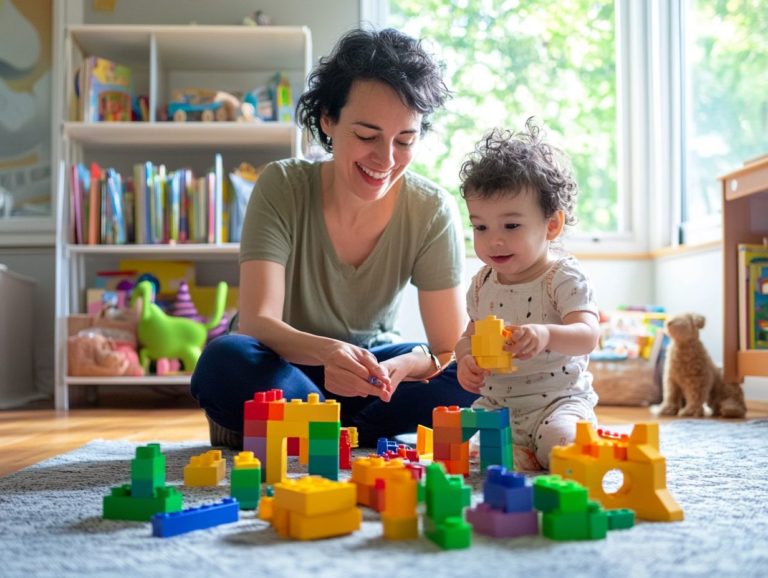The Importance of Being Present in Conversations
In today s fast-paced world, meaningful conversations can often seem like a rare treasure. Yet, being fully present in these exchanges is essential for building stronger connections, fostering deeper understanding, and enhancing emotional awareness. Join us on this exciting journey to unlock the transformative power of being fully engaged in each conversation.
This exploration delves into what it truly means to be present in conversations, why it holds such significance, and the barriers that can obstruct genuine interaction. It also highlights the role of mindfulness, curiosity, and intentionality in enhancing communication skills.
You ll discover practical tips to enhance your presence, paving the way for improved communication skills, richer relationships, and better mental health. Take charge of your conversations and embrace the journey with us.
Contents
- Key Takeaways:
- What Does It Mean to Be Present in Conversations?
- Why Is Being Present Important in Conversations?
- What Are the Barriers to Being Present in Conversations?
- 3. Lack of Empathy in Conversations
- How Can You Practice Being Present in Conversations?
- 1. Eliminate Distractions
- What Are the Benefits of Being Present in Conversations?
- Frequently Asked Questions
- The Importance of Being Present in Conversations
- What is the importance of being present in conversations?
- How does being present in conversations benefit us?
- What are some ways to be present in conversations?
- Why is being present in conversations challenging?
- How can being present in conversations improve our relationships?
- What are the consequences of not being present in conversations?
Key Takeaways:

- Being present in conversations means actively engaging and focusing on the conversation at hand, utilizing effective listening techniques like paying close attention to what someone is saying and responding thoughtfully.
- It is important because it builds stronger connections, enhances active listening, and improves understanding and empathy.
- To practice being present, eliminate distractions, practice active listening, show genuine interest in the conversation, and employ strategic communication techniques.
What Does It Mean to Be Present in Conversations?
To truly be present in conversations, you must engage fully with the speaker, embracing mindfulness and intentionality to forge meaningful connections. This goes beyond merely hearing the words; it requires you to grasp the emotions and intentions behind them through active listening and maintaining a focused mindset.
In a world that often moves at breakneck speed, distractions lurk around every corner. Cultivating this state of presence can profoundly elevate the quality of your interactions and relationships. By honing your focus, employing effective communication techniques, and showing curiosity, you can nurture deeper connections that enhance empathy and understanding key ingredients for successful interpersonal relationships.
Why Is Being Present Important in Conversations?
Being present in conversations is essential; it serves as the foundation of effective communication and builds meaningful connections between individuals. When you prioritize presence, you not only enhance your ability to engage actively but also elevate your emotional awareness, self-awareness, and understanding of others.
Research has demonstrated that those who practice active listening and exhibit empathy during conversations are more likely to forge stronger rapport and trust with their peers. This, in turn, significantly contributes to both professional success and personal growth.
Start practicing these techniques today to transform your conversations and deepen your connections.
1. Builds Better Relationships and Rapport
Being present in conversations allows you to build better relationships and rapport. This creates a space where people feel understood.
When you actively listen and engage with others, you show that you value their experiences and perspectives. This elevates the quality of your interactions and deepens your interpersonal relationships.
Creating a safe space for open dialogue is crucial. Techniques like maintaining eye contact, using non-verbal cues and body language, and asking open-ended questions help cultivate a connected atmosphere.
These approaches lead to exchanges that are not just meaningful but transformative. By dedicating time to truly hear what others are saying, you can respond in ways that reflect their feelings and thoughts, reinforcing mutual respect.
Using open-ended questions invites individuals to share their stories in greater detail, giving you a fuller understanding of their perspectives. This practice captures empathy, helping you understand others better.
Professionals like executive assistants often use this technique to develop stronger relationships with colleagues. As you engage in these practices, your relationships will flourish.
The resulting trust and rapport will establish a strong foundation for lasting connections an essential asset in both personal and professional life. This contributes to your personal growth and professional success.
2. Enhances Active Listening
Being present significantly enhances your active listening skills. This compels you to focus your attention on the speaker, filtering out distractions to foster deeper engagement.
Active listening goes beyond merely hearing words; it involves grasping the underlying emotions and intentions behind them. Listening intently can transform a casual exchange into a meaningful conversation.
This nuanced approach allows you to connect on a deeper level, promoting empathy and mutual respect. By employing techniques like reflective listening, you mirror back what has been said so the speaker feels valued and understood.
Integrating constructive feedback further clarifies messages and enriches dialogue. This creates an environment where the speaker feels safe to express their thoughts, establishing a foundation of trust and openness.
This level of mindfulness transforms mere exchanges into truly impactful conversations.
3. Improves Understanding and Empathy
Being present in conversations significantly enhances your understanding and empathy. This allows you to connect with others on a deeper emotional level.
When you engage fully, you cultivate greater emotional awareness, which helps you recognize and validate the feelings of those around you. This practice sharpens your communication skills and fosters healthier relationships built on mutual respect and compassion.
By embracing strategies like mindfulness and curiosity, you can deepen your understanding of others and create more empathetic interactions. These skills are particularly valuable in roles like executive assistants, mental health professionals, and those pursuing personal growth.
This connection becomes especially vital during conflicts, where miscommunication can escalate tension. Actively listening and observing body language can help you become more attuned to emotions that words alone may not fully express.
Research shows that empathetic communication leads to more effective conflict resolution. Simple yet powerful strategies, such as paraphrasing what someone has said or maintaining eye contact, can enhance your interpersonal dynamics.
Experts from Stanford University, like Matt Abrahams, Dan Klein, and Adam Tobin, emphasize the importance of these techniques in their courses such as “Quick Thinks” and “Think Fast Talk Smart.”
By prioritizing presence, you create an environment where openness and vulnerability can flourish. This ultimately results in richer connections and a stronger sense of community.
Dr. Kate Beaven-Marks from HypnoTC also advocates for this approach in fostering authentic communication and engagement.
Conclusion
Being present in conversations is key to building relationships, enhancing active listening, and improving understanding and empathy. Start applying these techniques today, and watch how they transform your personal and professional interactions!
What Are the Barriers to Being Present in Conversations?

Barriers to being fully present in conversations can greatly impede effective communication. These barriers create obstacles that hinder meaningful connections and disrupt the flow of conversation.
Common distractions like smartphones and background noise can easily draw your attention away from the speaker. This undermines the quality of the exchange. When you become preoccupied with your own thoughts or personal concerns, it can diminish your empathy, making it difficult to engage authentically. You can help mitigate these issues by maintaining a focused mindset and practicing deep breaths.
Recognizing and addressing these barriers is essential for enhancing your communication skills. This effort nurtures stronger interpersonal relationships and meaningful exchanges.
1. Distractions
Distractions are one of the primary barriers to being truly present in conversations. They divert your attention and diminish your capacity to engage meaningfully. In this era of constant notifications and multitasking, maintaining focus during interactions demands intentional effort and mindfulness.
Practicing reflective listening and other listening techniques can greatly improve your attention span. By recognizing these distractions whether they stem from digital devices or environmental noise you can develop strategies to minimize their impact and enhance your presence in communication.
Smartphones buzzing with alerts and the incessant hum of background chatter can pull your attention away from the dialogue. These interruptions disrupt the flow of conversation and create misunderstandings and a sense of disconnect.
Turn off those distracting notifications now to boost your focus! Consider designating ‘phone-free’ zones during critical discussions; this can significantly elevate your engagement levels. Active listening means fully concentrating on the speaker, which improves your interactions. Engaging in small talk can also help establish rapport before diving into more meaningful exchanges.
By fostering a more focused atmosphere, you can cultivate your attention span. This leads to more meaningful and productive exchanges.
2. Thinking Too Much About Yourself
Thinking too much about yourself is a significant barrier to being truly present in conversations. It can diminish your capacity for empathy and understanding. When your mind is caught up in your own thoughts or issues, you risk missing vital cues from the speaker, which can impair your ability to respond thoughtfully.
By cultivating self-awareness and redirecting your focus, you can overcome this barrier. This fosters deeper connections and more meaningful conversations. Intentionality in your engagement can also improve your conversation skills.
To tackle this challenge, practice active listening techniques, like summarizing or paraphrasing what the speaker has said. This shows that you re engaged and encourages a deeper comprehension of the discussion.
Mindfulness exercises, such as meditation or mindful breathing, can effectively quiet that internal dialogue. They promote a present mindset. These techniques are often recommended by communication experts.
Seeking feedback from others about your communication habits can provide valuable insights. It can reveal how your self-preoccupation might be perceived. This leads to proactive adjustments that enhance your overall effectiveness in communication. By implementing these strategies, you can shift your attention away from internal distractions and focus on the thoughts and feelings of others. This enriches your interactions and nurtures genuine, meaningful connections.
3. Lack of Empathy in Conversations
A lack of empathy stands as a formidable barrier to being fully present in conversations. It stifles your ability to understand and connect with others. When you don t take the time to acknowledge and appreciate the feelings of those you engage with, effective communication becomes a daunting challenge.
Cultivating emotional intelligence, which means understanding your feelings and those of others, and honing your active listening skills can help you remove this barrier. This ultimately transforms your exchanges into more productive and meaningful experiences. Practices like mindfulness and reflective listening are crucial in this process.
When you overlook the emotions of others, misunderstandings can easily take root. This leads to conflicts that are often unnecessary. The absence of empathy not only impedes conversations but also strains relationships, making it difficult to foster trust and rapport.
Enhancing your emotional intelligence involves becoming attuned to your own feelings while learning to decipher the emotional cues of those around you. By embracing active listening an approach that demands genuine engagement and a commitment to grasping the speaker s perspective you can cultivate an environment where open dialogue thrives.
This shift not only deepens your connections but also lays the groundwork for healthier, more fulfilling interactions. Incorporating non-verbal cues and showing curiosity can further enhance this process.
How Can You Practice Being Present in Conversations?
You can practice being present in conversations with intentional strategies designed to eliminate distractions and foster active engagement. By consciously committing to mindfulness techniques like deep breathing and directing your attention you can significantly enhance your ability to connect with others.
Strategies such as maintaining a focused mindset and practicing self-awareness are key to this improvement. Displaying genuine interest in the conversation through reflective listening and insightful questioning not only demonstrates your presence but also enriches the dialogue.
This practice is essential for cultivating meaningful relationships and elevating your overall communication skills. Open-ended questions and conversation techniques such as mirroring and summarizing can enhance the flow and depth of the conversation.
1. Eliminate Distractions
One effective way to practice being present in conversations is to eliminate distractions that can interfere with your focus and engagement. This might mean setting aside your devices, opting for a quiet environment, or mentally preparing yourself to fully commit to the interaction.
By cultivating a focused mindset, you create the ideal conditions for meaningful exchanges. Techniques like taking deep breaths and using conversation starters can also be beneficial.
Turning off notifications and placing your phone out of reach can significantly aid in maintaining concentration. Picture yourself sitting across from someone while your phone vibrates incessantly; it pulls your attention away and disrupts the flow of dialogue.
Another valuable technique is to practice active listening. This involves not only hearing the words spoken but also demonstrating genuine interest through your body language and verbal affirmations. Engaging in such practices fosters a deeper connection and allows both you and the other person to feel valued.
Reflective practice and maintaining eye contact can further enhance the quality of your interactions. By regularly applying these strategies, you can transform your conversational skills, making interactions more fulfilling and impactful.
In conclusion, by practicing empathy, eliminating distractions, and engaging fully in conversations, you can create meaningful connections. Start applying these strategies today to enhance your communication skills and enrich your relationships!
2. Practice Active Listening

Practicing active listening is essential for truly engaging in conversations. It requires your full attention and empathetic involvement with the speaker.
Listening intently and using techniques from experts like Matt Abrahams and Dan Klein can provide valuable insights.
This means putting aside distractions and sincerely focusing on the message being shared. Techniques like taking deep breaths or summarizing what you ve heard can enhance this practice, ensuring that you remain not only present but also responsive to the needs of the conversation. This approach is part of effective listening and can significantly improve your conversation skills.
Reflective listening, where you mirror back what you understand, can deepen connections and validate the speaker’s feelings. By refining your active listening skills, you can significantly elevate your communication effectiveness, building trust and understanding in relationships.
Ultimately, these techniques enrich your personal interactions and elevate your professional engagements, paving the way for clearer dialogue and enhanced collaboration. Such strategic communication can positively impact both mental health and personal growth.
3. Show Genuine Interest in the Conversation
Showing genuine interest in a conversation is essential for being present and engaging with others. You can accomplish this by maintaining eye contact, asking open-ended questions, and actively participating in the dialogue. The use of intentionality and curiosity can further enhance your engagement.
When you demonstrate authentic curiosity about the other person’s thoughts and feelings, you create a supportive environment that invites meaningful exchange and enhances effective communication.
Building on this foundation, you can further enrich your interactions by listening actively and responding thoughtfully to the points raised during the exchange. Techniques such as nodding in agreement, leaning slightly forward, or mirroring the other person’s body language can reinforce your attentiveness and create a stronger sense of connection. Understanding non-verbal cues and maintaining presence can also significantly improve the flow of conversation.
Incorporating reflective listening where you paraphrase or summarize what the other person has said validates their contributions and encourages deeper discussion. Engaging in conversations with this approach enhances relational dynamics and fosters trust, making the dialogue more enjoyable and productive. Such techniques are foundational for authentic communication and relationship-building.
What Are the Benefits of Being Present in Conversations?
The advantages of being actively present in conversations are immense! They profoundly influence your communication skills and interpersonal relationships.
By fully engaging with others, you not only enhance your ability to connect but also deepen your understanding and empathy. Practices like listening intently and using effective communication techniques are crucial in this context.
This fosters stronger relationships, more enriching conversations, and elevated emotional intelligence elements essential for both personal and professional success. Embracing mindfulness in your interactions can lead to exchanges that are not only more productive but also significantly more enjoyable. Engaging in reflective practice and maintaining self-awareness can further enhance these benefits.
1. Improved Communication Skills
Being present in conversations enhances your communication skills. It requires you to actively engage with others and refine your listening techniques. This focused approach deepens your understanding of the speaker and improves your ability to articulate thoughtful responses. As you practice presence, you naturally develop better emotional awareness, which paves the way for more effective and empathetic communication. Developing these skills can transform your personal and professional relationships!
For example, when someone shares a personal story, employing techniques like nodding, maintaining eye contact, and summarizing their key points shows that you are genuinely engaged. This level of engagement fosters a safe environment for open dialogue and builds trust, encouraging deeper discussions. Such practices are essential for effective listening and improving your conversation skills.
Being present also enables you to recognize non-verbal cues (like body language and facial expressions), which often communicate more than words ever could. This heightened awareness of emotions enriches your interactions and can lead to more meaningful connections, making individuals feel heard and validated. Ultimately, this enhances your overall communication effectiveness. Engaging in reflective practice and maintaining a focused mindset are key to achieving this.
2. Stronger Relationships
One of the key benefits of being present in conversations is that it helps you cultivate stronger relationships. This fosters meaningful connections and encourages empathy among individuals. When you actively listen and engage with others, you demonstrate your commitment to understanding their thoughts and feelings, enhancing trust and rapport. These stronger relationships have a positive ripple effect on both your personal and professional life, leading to more fulfilling interactions. Such relational skills can significantly impact your mental health and overall well-being.
Being fully engaged enriches your individual relationships and creates a supportive environment where open communication can flourish. Over time, this approach reduces misunderstandings and conflicts, paving the way for collaborative efforts in the workplace. Understanding the perspectives of others and maintaining a focused mindset are key components of this approach.
In your personal relationships, showing genuine interest and empathy can deepen emotional bonds, allowing vulnerability and honesty to thrive. The long-term benefits of this practice manifest in a more resilient network of connections, enhancing your personal satisfaction and professional success through increased loyalty, improved collaboration, and a stronger sense of community. These practices are essential for both personal growth and interpersonal relationships.
3. Increased Empathy and Understanding
Being present in conversations significantly enhances your empathy and understanding, essential for cultivating healthy relationships. When you engage fully, you become more attuned to the emotions and perspectives of others, allowing you to respond with greater sensitivity and insight. This approach benefits authentic communication and building rapport.
This heightened emotional awareness not only enriches your conversations but also fosters a more supportive and compassionate environment for everyone involved. Such emotional awareness is crucial for effective communication and mental health.
Imagine a scenario where a friend shares a personal struggle. If you are fully present, you won t just hear their words; you ll also pick up on non-verbal cues like body language and tone of voice. This level of engagement gives you the power to validate feelings and ask thoughtful questions, building a trust that strengthens your bond.
In contrast, distracted or disengaged interactions often lead to misunderstandings and conflict, highlighting just how crucial presence is.
By prioritizing attentive listening and genuine responses, you can create a space where vulnerability is welcomed, ultimately enhancing your connections and enriching your relationships.
Frequently Asked Questions

The Importance of Being Present in Conversations
What is the importance of being present in conversations?
The importance of being present in conversations lies in the fact that it allows for effective communication and understanding between individuals. Being fully engaged and attentive in a conversation shows respect and builds stronger relationships.
How does being present in conversations benefit us?
Being present in conversations allows us to fully listen and understand the perspectives and feelings of others. It also helps us to better express our own thoughts and emotions, leading to more meaningful and productive conversations.
What are some ways to be present in conversations?
There are many ways to be present in conversations, such as maintaining eye contact and actively listening.
Asking questions and showing empathy are also effective. Avoid distractions, like checking your phone, to remain fully engaged.
Why is being present in conversations challenging?
In today’s fast-paced world, it can be challenging to focus on one thing at a time. With constant distractions and the pressure to multitask, it can be difficult to give our full attention to a conversation. It’s essential to focus on being present in conversations to communicate effectively.
How can being present in conversations improve our relationships?
Being present in conversations can improve our relationships by improving communication and understanding. It also shows that we value and respect the other person, leading to stronger and more meaningful connections.
What are the consequences of not being present in conversations?
Not being present in conversations can lead to misunderstandings, miscommunication, and strained relationships. Being absent in a conversation can make someone feel ignored and undervalued, leading to trust issues. Don’t let distractions cost you the chance to connect deeply with others.






